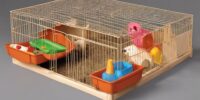Why You Should Carry a First-Aid Kit for Your Guinea Pig
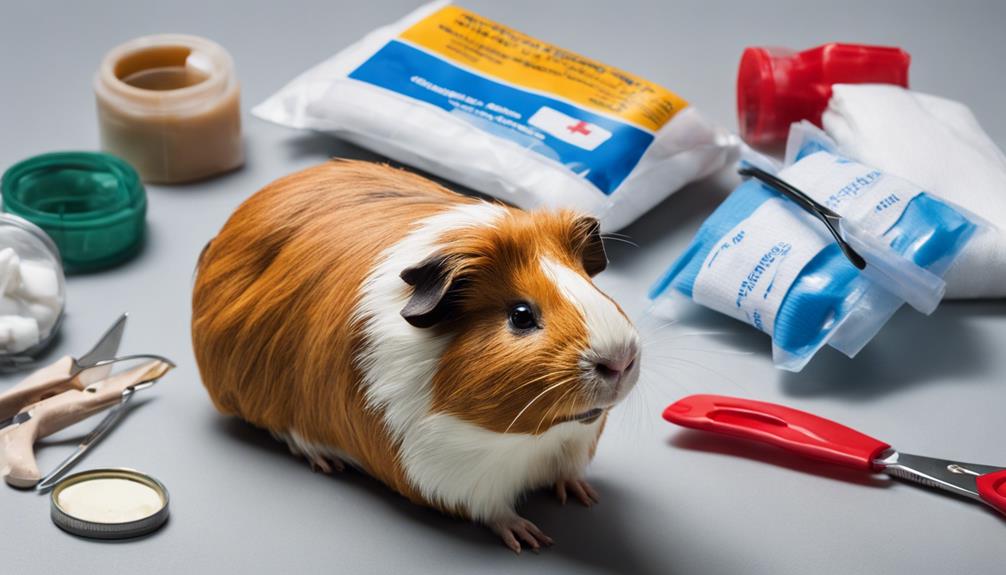
Having a first-aid kit specifically designed for your guinea pig is essential to ensure their health and well-being. Accidents and illnesses can happen unexpectedly, so being prepared with the necessary supplies can make a significant difference in providing prompt care. Some items to include in your guinea pig first-aid kit are sterile gauze pads, bandages, antiseptic wipes, styptic powder for nail trimming accidents, and a small pair of scissors. Additionally, having a list of emergency contact numbers for your veterinarian and an after-hours animal hospital can be crucial in case of emergencies. Regularly checking and updating your guinea pig's first-aid kit will help you be ready to handle any health issues that may arise.
Ensuring that your guinea pig's first-aid kit is easily accessible and well-organized can save valuable time in emergency situations. Placing the kit in a designated spot where it can be quickly grabbed in case of an emergency is important. Familiarizing yourself with the contents of the kit and knowing how to use them properly is also essential. Being prepared and equipped with a well-stocked first-aid kit can give you peace of mind and help you provide immediate care to your guinea pig when needed. Remember, it's always better to be prepared for the unexpected when it comes to your beloved pet's health and safety.
Key Takeaways
- Crucial for immediate response in guinea pig emergencies
- Helps prevent infections and aids in quick treatment
- Essential for effective wound care and medication administration
- Ensures preparedness for unexpected health issues and potential life-saving interventions
Importance of Guinea Pig First-Aid Kit
Having a well-equipped first-aid kit for your guinea pig is crucial for ensuring their health and well-being in case of emergencies. Guinea pigs, while generally hardy pets, can still face health issues that require immediate attention. Being prepared with a first-aid kit allows for quick and effective emergency response, potentially saving your pet's life.
Preventive care is another important aspect of having a guinea pig first-aid kit. Regularly checking your pet for any signs of illness or injury can help you catch problems early on. Including items like nail clippers, styptic powder for nail trimming accidents, and a small scale for monitoring weight changes can aid in preventive care measures.
Common Guinea Pig Injuries
Guinea pigs, despite being hardy pets, can be prone to various injuries that may require immediate attention to guarantee their health and well-being. Injury prevention is key to ensuring your furry friend stays safe and happy. Common injuries in guinea pigs include cuts and scrapes from sharp objects in their environment, such as wire cages or rough bedding. Quick response to these injuries is important to prevent infection.
Another common injury is broken bones, often caused by falls from heights or improper handling. If you suspect your guinea pig has a broken bone, seeking emergency veterinary care promptly is crucial. Additionally, guinea pigs are prone to eye injuries from sharp objects or rough play with cage mates. Keeping their living space free of hazards can help prevent such incidents.
Being prepared to handle these common injuries with a well-equipped first-aid kit can make a significant difference in your guinea pig's recovery. Remember, quick response and proper care are crucial in ensuring your guinea pig's well-being.
Signs of Guinea Pig Distress
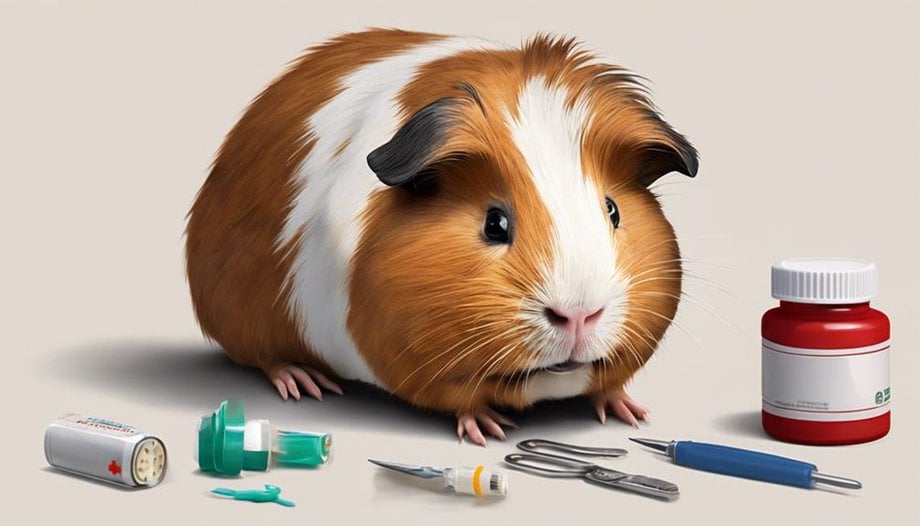
What're the telltale signs that your furry companion, the guinea pig, may be experiencing distress? Recognizing distress signals in your guinea pig is important for providing timely care and ensuring their well-being. These small pets are masters at hiding discomfort, making it essential for pet owners to be vigilant and observant.
One common indicator of distress in guinea pigs is a sudden change in behavior. If your usually active and social guinea pig becomes withdrawn or irritable, it could be a sign that something is amiss. Additionally, unusual vocalizations, such as persistent squeaking or whimpering, may indicate discomfort or pain. Physical signs like rapid breathing, lethargy, hunched posture, or refusal to eat are also red flags that your guinea pig needs immediate attention.
In case you notice any of these distress signals, it's important to act promptly with an emergency response. Contacting a veterinarian who specializes in small animals and providing necessary first aid can make a significant difference in your guinea pig's health and recovery. Remember, being attuned to your guinea pig's needs can help prevent minor issues from escalating into more severe problems.
Essential First-Aid Supplies
As a responsible guinea pig owner, having essential first-aid supplies on hand is important for ensuring the well-being of your furry friend.
Basic wound care items like sterile gauze, antiseptic wipes, and bandages can help address minor injuries swiftly.
Being prepared to handle emergencies and administer medications can make a significant difference in your guinea pig's health and comfort.
Basic Wound Care
Having a well-stocked first-aid kit is essential for providing basic wound care for your guinea pig in times of need. When it comes to wound healing and prevention tips for your furry friend, being prepared is key. Here are some essential items to have in your first-aid kit:
- Sterile gauze pads
- Antiseptic wipes
- Styptic powder
- Small scissors
- Non-stick bandages
In case of an emergency, knowing how to properly clean and dress a wound can make a significant difference in your guinea pig's recovery. By having these supplies readily available, you can make sure that you're equipped to handle minor injuries promptly and effectively, promoting the well-being of your beloved pet.
Handling Emergencies
During unexpected emergencies, having essential first-aid supplies readily available can be a lifesaver for your guinea pig. When it comes to emergency response and quick action, preparation is key. Below is a table highlighting some essential first-aid supplies to have on hand for handling emergencies with your guinea pig:
| Category | Essential Supplies |
|---|---|
| Wound Care | Sterile gauze, bandages |
| Breathing Difficulties | Pet-safe disinfectant spray, |
| clean towels | |
| Ingestion of Toxins | Hydrogen peroxide, |
| activated charcoal | |
| Fractures | Soft padding, splinting |
Medication Administration
Carry essential first-aid supplies in your guinea pig's kit to effectively administer medication during emergencies. Proper dosages are important when giving medication to your furry friend, so always consult with a vet for guidance.
Here are some tips to guarantee medication safety:
- Consult a Veterinarian: Seek professional advice on the correct medication and dosage for your guinea pig.
- Use a Syringe: Administer liquid medication accurately using a syringe to make sure of proper dosages.
- Monitor Behavior: Keep an eye on your guinea pig's behavior after administering medication for any adverse reactions.
- Store Medication Safely: Store all medications in a secure place out of reach of children and pets.
- Follow Instructions: Always follow the vet's instructions carefully to make sure of your guinea pig's well-being.
First-Aid Kit Preparation Steps
Consider stocking your guinea pig's first-aid kit with essential supplies to guarantee you're prepared for any unexpected health issues. First aid kit organization is key to ensuring you can quickly access the necessary items in case of an emergency. Here are some steps for preparing a well-organized first-aid kit for your beloved pet:
| Category | Supplies |
|---|---|
| Wound Care | Antiseptic wipes, gauze pads, adhesive tape |
| Medications | Styptic powder, probiotics, pain relief medication |
| Tools | Nail clippers, syringe for feeding, small scissors |
Handling Guinea Pig Emergencies
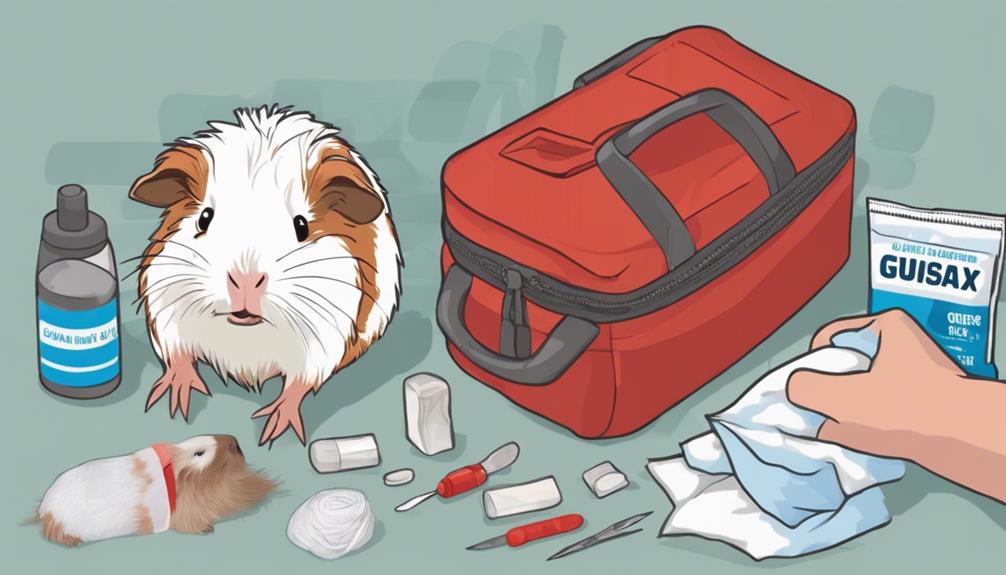
In times of distress, quick and decisive action can make all the difference when facing guinea pig emergencies. Whether it's a sudden injury or a sign of illness, being prepared to handle these situations is critical for your beloved pet's well-being.
Here are some key points to keep in mind for effective emergency response:
- Stay Calm: Your guinea pig can sense your emotions, so remaining calm can help keep them at ease.
- Assess the Situation Quickly: Identify the issue and determine if it's something you can address or if veterinary assistance is needed.
- Handle with Care: Be gentle when handling your guinea pig to avoid causing further harm or distress.
- Administer First Aid: If you have a first-aid kit, use it appropriately while waiting for professional help.
- Monitor Closely: Keep a close eye on your guinea pig's condition and behavior to provide updates to the vet.
Quick intervention and a level-headed approach are key in ensuring the best possible outcome during guinea pig emergencies.
Contacting a Vet Quickly
Quickly reaching out to a vet is essential when your guinea pig is experiencing an emergency situation, ensuring prompt and professional care for your furry friend. In moments of crisis, clear vet communication is vital. Have the vet's contact information readily available in your first-aid kit or saved in your phone for easy access. This preparation can save precious time and allow for immediate care to be administered to your guinea pig.
When contacting the vet, be prepared to provide details about your guinea pig's symptoms, behavior, and any relevant history. This information will assist the vet in determining the severity of the situation and what emergency procedures may be necessary. Follow the vet's instructions carefully while awaiting veterinary assistance, as they may provide crucial guidance on how to stabilize your guinea pig before bringing them in for treatment.
Regular First-Aid Kit Inspection
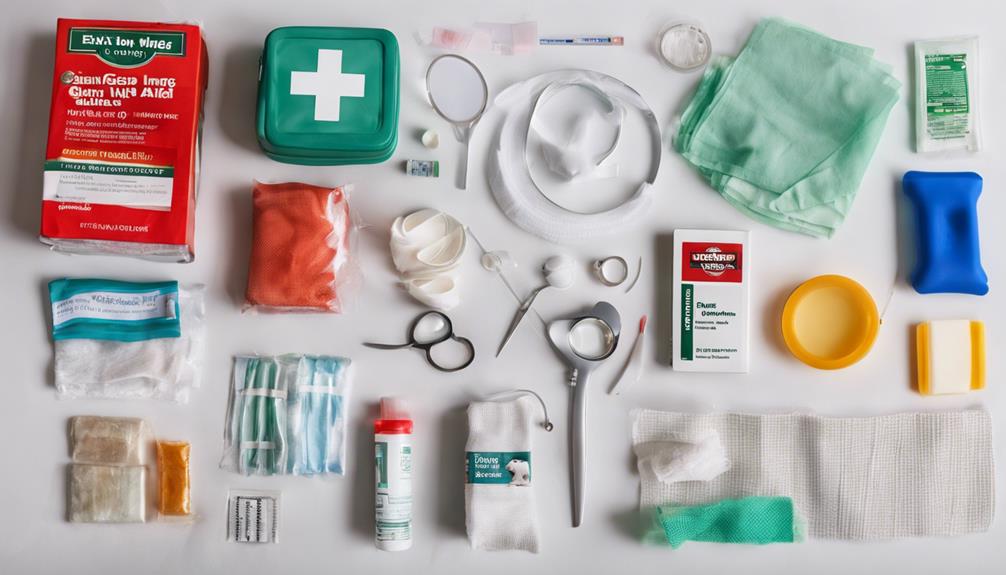
When guaranteeing the well-being of your guinea pig, it's important to routinely inspect your first-aid kit to maintain its readiness for any potential emergencies. Regularly checking your kit guarantees that you're well-prepared to handle any unexpected health issues that may arise with your beloved pet.
- Kit maintenance: Guarantee all items are in good condition and replace any used or expired supplies promptly.
- Check expiration dates: Regularly review the expiration dates of medications and ointments to guarantee their effectiveness when needed.
- Emergency preparedness: Familiarize yourself with the items in the kit and their uses to act swiftly during emergencies.
- Training drills: Practice using the supplies in the kit through mock scenarios to improve your response in real-life situations.
- Restocking: Regularly replenish any used items to maintain a fully stocked and functional first-aid kit.
Frequently Asked Questions
Can I Use a Regular First-Aid Kit for My Guinea Pig, or Do I Need to Buy a Specific One?
When it comes to caring for a guinea pig in an emergency, having general first aid knowledge is essential. While a regular first-aid kit can be helpful, it's wise to purchase or assemble a specific one for your guinea pig's unique needs.
Are There Any Common Household Items That Can Be Used in Place of Specific First-Aid Supplies for Guinea Pigs?
In a pinch, DIY alternatives can suffice for guinea pig first aid. Common household items like clean towels, saline solution, and cornstarch can be makeshift solutions for minor emergencies until proper supplies are obtained.
How Often Should I Check and Restock My Guinea Pig's First-Aid Kit?
Regularly check and restock your guinea pig's first-aid kit. Guarantee supplies are not expired, stored correctly. Be alert for emergency signs; if unsure, contact a vet promptly. Proactive maintenance can be a lifesaver in unexpected situations.
Are There Any Specific First-Aid Techniques or Procedures That Are Unique to Guinea Pigs?
Common techniques for guinea pig first-aid include wound cleaning, nail trimming, and administering medications. Emergency procedures like CPR and handling heatstroke are essential to know. Being prepared with a well-stocked kit is vital.
Can I Administer Any Over-The-Counter Medications to My Guinea Pig in Case of an Emergency, or Should I Always Consult a Vet First?
In times of emergency, always consult a vet before giving over-the-counter medications to your guinea pig. Quick vet consultation guarantees proper care and prevents potential harm. Stay cautious and prioritize your pet's well-being over immediate solutions.




